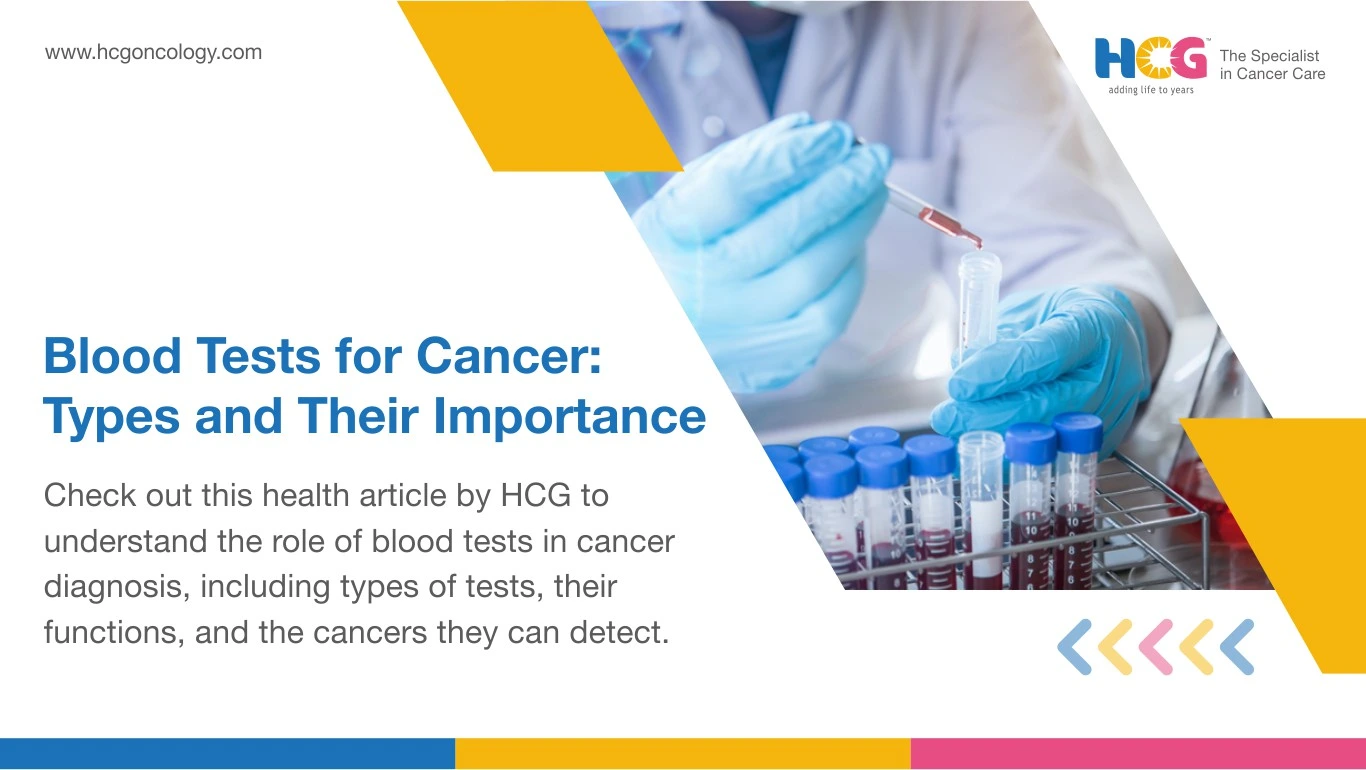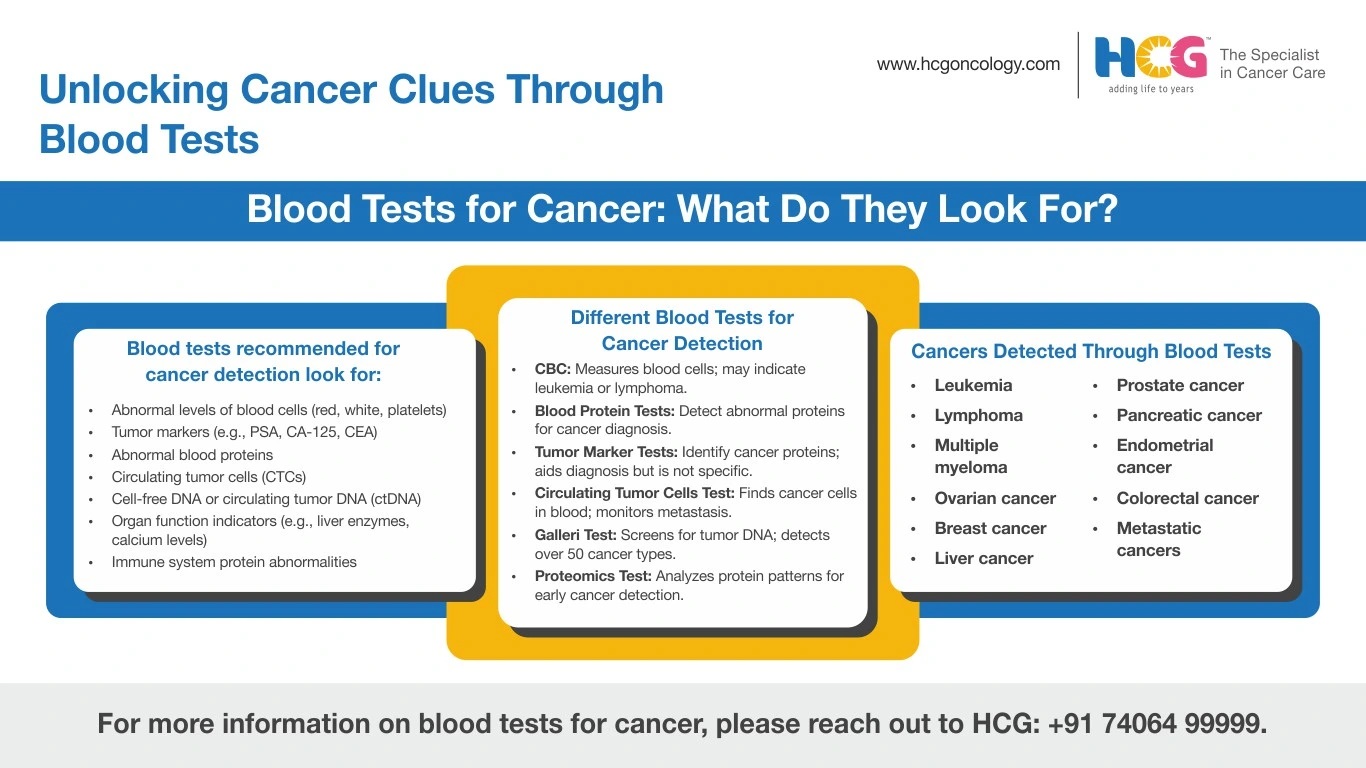
13 Nov, 2025
Feel free to reach out to us.

13 Nov, 2025

This article is medically reviewed by Dr. Jyoti Ranjan Swain, Consultant - Surgical Oncology, HCG Panda Cancer Hospital, Cuttack.
Blood tests play a pivotal role in the diagnosis, monitoring, and management of different types of cancer. They help identify abnormalities, detect cancer markers, and provide insights into overall health.
Technological advancements have led to the development of some crucial blood tests for early cancer detection, such as the Galleri test, tumor marker blood test, and circulating tumor cells test.
The Internet is flooded with information on a blood test for cancer, a blood test to detect cancer, or a blood scan for cancer. Consuming information from so many sources can be overwhelming.
Through this article, we are trying to provide all the necessary information about blood tests in one place.
"Can blood tests detect cancer?"
This is a burning question that we start this detailed article with.
The answer is yes.
Blood tests are capable of detecting some forms of cancer, but not all. Usually, blood tests look for identifiable tumor or cancer markers, proteins, or tumor cells roaming in the bloodstream.
The importance of blood tests cannot be overstated in the detection phase, as they help a great deal in determining whether more advanced investigations like CT scans or biopsies are needed. They form a crucial part of cancer management.

If a patient is suspected to have cancer, blood tests may be recommended to look for tumor markers (which may be proteins, genes, or other substances), cancer cells, or DNA from tumor cells. These observations from blood tests can help doctors determine if additional tests are required to arrive at a conclusive diagnosis.
The following are the different cancers that can be detected by blood tests:
The importance of these tests cannot be overstated, as they help in the early detection of cancer, increase the efficiency of treatment, and enhance the chances of survival. They highlight the potential of a blood test for cancer in its nascent stages.
A fundamental diagnostic tool is the complete blood count test. It measures red blood cells, white blood cells, hemoglobin, and platelets. To illustrate, abnormal counts, like high or low WBCs, can be a sign that someone has cancer, e.g., leukemias and lymphomas.
Blood protein tests are used to check for abnormal proteins such as M-proteins linked to multiple myeloma. Even though they do not indicate cancer in particular, these tests are combined with other diagnostic procedures to confirm their validity.
The tumor marker blood tests identify proteins or antigens manufactured by cancerous cells. These markers aid in the diagnosis of patients and also in monitoring the effectiveness of treatment.
It is important to note that elevated levels of tumor markers are associated with various non-cancerous conditions as well. Therefore, it is important to not just rely on cancer marker blood tests and undergo additional tests for an accurate diagnosis.
The circulating tumor cells test is crucial for identifying cancerous cells that are present in the bloodstream as well as determining metastasis. It is important in monitoring patients with breast, prostate, and colorectal cancers.
There is no one blood test to find cancer in the early stages. There are many blood tests that are recommended to look for the presence of tumor growth in the body. In some cases, these tests can help in early detection of different types of cancer, even before they become apparent. These tests may also help in detecting cancers that show no symptoms in the early stages, i.e., silent cancers.
The Galleri test is an innovative discovery that can identify more than 50 cancer types. It works by examining the DNA released by tumors in the blood, offering an opportunity to identify cancers before symptoms appear.
The examination of protein patterns in blood using proteomics plasma tests helps in the recognition of anomalies linked to cancer. Even though it is not yet fully developed, this is a very promising technology that could completely change how we detect cancer at its earliest stages.
The presence of tumors can be indirectly detected through blood tests that identify abnormal proteins, cancer markers, or circulating tumor cells. While they cannot definitively confirm a tumor’s presence, they often guide further diagnostic imaging like CT or MRI scans. Tests like tumor marker blood tests and the Galleri test are very important, serving as the first indication of cancer.
Blood tests for cancer operate by analyzing components in the blood to identify irregularities associated with cancer. Such abnormalities may comprise increased levels of tumor markers, proteins, or the presence of circulating tumor cells (CTCs).
Blood tests are important because they enable one to diagnose, monitor progress, and customize the treatment of any disease.
At HCG, which is a leading hospital for cancer treatment in India, we have revolutionized cancer diagnostics and treatment. We offer comprehensive screening and diagnostic programs for cancer detection and diagnosis through state-of-the-art methodologies such as the Galleri test, tumor marker blood test, and circulating tumor cells test, along with complete blood count tests as well as other specific blood tests to find cancer. These tests aim at detecting cancers in their early stages when they can be effectively treated with excellent clinical outcomes.
In the detection and treatment of cancer, blood tests play a very important role. These tests enable us to recognize specific markers and keep track of circulating tumor cells for immediate, efficient treatment as well as follow-up care. Even though certain cancers cannot be detected by these tests alone, advancements like the Galleri test and tumor marker blood test increase the chances of early detection and timely treatment.

Dr. Jyoti Ranjan Swain
Consultant - Surgical Oncology
MBBS, MS, FICS, FACS, MCh (Surgical Oncology)
Dr. Jyoti Ranjan Swain is an experienced surgical oncologist with vast experience in performing various cancer surgeries. He is available for consultations at HCG Panda Cancer Hospital, a top-ranking cancer hospital in Cuttack. His treatment approach is to provide the best quality of care for his patients by providing the latest surgical techniques and evidence-based medical practices. He also believes in a multidisciplinary approach to cancer treatment and strives to provide comprehensive care to his patients.
To book an appointment with Dr. Jyoti Ranjan Swain, please click here.
